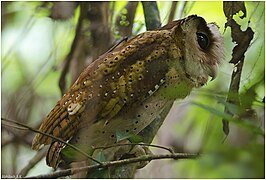| Sri Lanka bay owl | |
|---|---|

| |
| Song of P. a. ripleyi | |
| Conservation status | |
 Least Concern (IUCN 3.1) | |
| CITES Appendix II (CITES) | |
| Scientific classification | |
| Domain: | Eukaryota |
| Kingdom: | Animalia |
| Phylum: | Chordata |
| Class: | Aves |
| Order: | Strigiformes |
| Family: | Tytonidae |
| Genus: | Phodilus |
| Species: | P. assimilis |
| Binomial name | |
| Phodilus assimilis Hume, 1877 | |

| |
| Distribution map of Sri Lanka Bay Owl | |
The Sri Lanka bay owl (Phodilus assimilis) is a species of bay owl in the family Tytonidae. It is endemic to the island of Sri Lanka and the Western Ghats in Kerala, South Western India. It was considered a subspecies of the Oriental bay owl (Phodilus badius) but is now treated as a full species due to its distinctive call, plumage and disjunct distribution.
Its natural habitats are subtropical or tropical moist montane forests and subtropical or tropical high-altitude grassland. It is threatened by habitat loss.
Taxonomy
The Sri Lanka bay owl was described by the English politician and naturalist Allan Octavian Hume in 1873 but it was only in 1877 that he introduced the binomial name Phodilus assimilis. The genus name Phodilus is from the Ancient Greek phōs for "light" or "daylight" and deilos for "timid" or "cowardly". The specific epithet assimilis is the Latin for "similar" or "like".
It was earlier considered a subspecies of the Oriental bay owl Phodilus badius, but now treated as a separate species based on differences in call and plumage.
Two subspecies are recognised:
- P. a. ripleyi Hussain & Reza Khan, 1978 - Western Ghats
- P. a. assimilis A. O. Hume, 1877 – Central & southern Sri Lanka
The Indian subspecies is found along the Western Ghats mostly south of Goa but as they are secretive, records are rare and their presence has often been detected only upon the discovery of injured individuals. The breeding season is in winter when the distinctive song consisting of multiple whistles with inflections can be heard.
Gallery
-
 Phodilus assimilis in Kalakad Mundanthurai Tiger Reserve
Phodilus assimilis in Kalakad Mundanthurai Tiger Reserve
-
 Sri Lanka bay owl at Arippa forest, Trivandrum, Kerala, India
Sri Lanka bay owl at Arippa forest, Trivandrum, Kerala, India
-
 In Top Slip, Anamalai Hills, Tamil Nadu
In Top Slip, Anamalai Hills, Tamil Nadu
References
- BirdLife International (2016). "Phodilus assimilis". IUCN Red List of Threatened Species. 2016: e.T22725132A94886019. doi:10.2305/IUCN.UK.2016-3.RLTS.T22725132A94886019.en. Retrieved 20 November 2021.
- "Appendices | CITES". cites.org. Retrieved 2022-01-14.
- Hume, Allan Octavian (1871). "Notes". Stray Feathers. 5: 137–138.
- Hume, Allan Octavian (1873). "Phodilus badius". Stray Feathers. 1: 429.
- Jobling, James A. (2010). The Helm Dictionary of Scientific Bird Names. London: Christopher Helm. pp. 57, 303. ISBN 978-1-4081-2501-4.
- Rasmussen, P.C. (2005). "Biogeographic and conservation implications of revised species limits and distributions of South Asian birds". Zoologische Mededelingen Leiden. 79: 137–146.
- Rasmussen, Pamela C.; Anderton, John C. (2005). Birds of South Asia. The Ripley Guide. Vol. 2. Washington D.C. and Barcelona: Smithsonian National Museum of Natural History and Lynx Edicions. p. 235. ISBN 978-84-87334-66-5.
- del Hoyo, J.; Collar, N.; Marks, J.S. (2017). del Hoyo, J.; Elliott, A.; Sargatal, J.; Christie, D.A.; de Juana, E. (eds.). "Sri Lanka Bay-owl (Phodilus assimilis)". Handbook of the Birds of the World Alive. Lynx Edicions. Retrieved 23 December 2017.
- Gill, Frank; Donsker, David, eds. (2017). "Owls". World Bird List Version 7.3. International Ornithologists' Union. Retrieved 23 December 2017.
- Hussain, S.A.; Khan, M.A.R. (1978). "A new subspecies of Bay Owl (Phodilus badius) from Peninsular India". Journal of the Bombay Natural History Society. 74: 334–336.
- Raman, T.R. Shankar (2001). "Observations on the Oriental Bay Owl Phodilus badius and range extension in the Western Ghats, India" (PDF). Forktail. 17: 110–111.
- Mudappa, Divya C. (1998). "Sight record of the Oriental Bay Owl (Phodilus badius ripleyi) in the Anaimalai Hills, southern Western Ghats, India". Journal of the Bombay Natural History Society. 95: 343.
External links
This owl-related article is a stub. You can help Misplaced Pages by expanding it. |